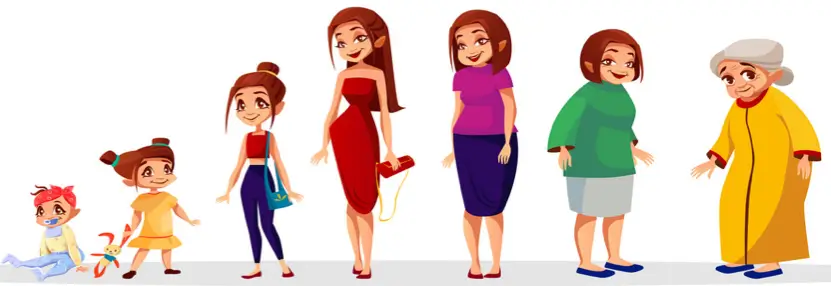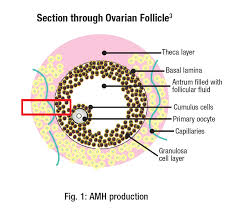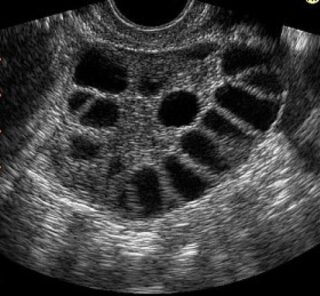Women are born with around 2,000,000 eggs, which is all the eggs they’ll ever have. Eggs are continuously lost, so by the onset of puberty most women have around 400,000 eggs left. By a woman’s late 30s this number will have further declined to around 27,000. At the onset of menopause most women only have around 1,000 eggs left in their ovaries.

A decrease in the egg quantity and quality of a woman in her lifetime is termed as poor ovarian reserve.
If poor ovarian reserve (Low AMH) occurs in the reproductive years of a woman it does affect the child bearing process.
If this condition occurs once the child bearing is completed, it is considered a natural body phenomenon and one can expect early menopause.
Studies have shown that Indian women age faster as compared to the European or Caucasian women. These women have menopause around 50-53 years , while Indian women may have around 46-48years. This early menopause is associated with early decline in egg number and egg quality of Indian women. This is not a disease but it’s a constitutional / genetic prevalence in Asian population. Sometimes as early as 30 years, the number of eggs in indian women starts declining. However, after 35-37 years a steep fall is seen in the reproductive potential of a woman. Hence one needs to understand that the reproductive potential is different between these two types of women. Although the western literature quotes acceptable pregnancies with IVF /ICSI with their own eggs in women around the age of 40 or so, it’s incorrect to assume the same for Indian women.
Women experiencing reduction in their ovarian capacity in the form of low antral follicular count or low AMH will have shortening in her menstrual cycle. These women will have regular menses, but may have frequent menses eg. 24-26 day cycle. If this pattern is repeated in three cycles or more, then you must consult a reproductive medicine or infertility specialist. This happens as the follicular phase of the cycle (duration of formation of egg) goes on reducing. The luteal phase (post egg release) remains the same i.e. 14 days. Hence along with decline in egg quality the timing for ovulation is also distrubed in these women.
All of this leads to a rapid aging process.
In simple language, let’s say that the age of menopause for a lady is around 48 years. In that case her ovarian reserve will start declining approximately 13 years earlier, so roughly around 35 years.
Now there is another lady who would attain menopause at 42 years due to any of the reasons mentioned above. Her ovarian reserve and egg quality as well as number will start reducing from the age of 29 years itself. Hence if she decides to delay her pregnancy, she may have problems in conceiving naturally at a later date.
There are various tests to determine the ovarian reserve. One of the most important and reliable ones is the antral follicular count (AFC).This is basically an ultrasonography done during your menstruation day2 or day 3 (when you are still bleeding) to check the number of small follicles which will become eggs at a later date. We, at Ankoor Fertility Clinic perform this ultrasound (USG) on a routine basis and count the number of eggs in each ovary (antral follicle count). If we find that the number of eggs are less, patients are advised to take a blood test called AntiMullerian Hormone (AMH). So, the lesser the AMH level, the lesser is the fertility potential of that woman.
No, there isn’t a way to increase the number of eggs in a woman’s ovary. However, to keep the quality of the existing eggs intact and to prevent miscarriages, first and foremost the female is advised lifestyle changes. Atleast, 10% of weight loss in case of obesity helps. Also, supplements like DHEA help.
AMH – Is an ovarian reserve test.
It is a direct product of both cumulus & mural granulosa cells from preantral & small antral follicles during early folliculogenesis.
AMH will decline years prior to a rise in FSH.
Earlier, More sensitive , Real time biomarker.
Greater correlation with primordial follicle pool.


The small cystic structures seen on ultrasound in the ovary are known as antral follicle count.
In cases of poor reserve, this number is very less when seen on ultrasound.
First and foremost, when the woman presents to us at Ankoor Fertility Clinic, it is important for us to go to the depths of each case and find out the cause of her low egg count. Then we have to look into whether the cause is treatable or not. If treatable, we give a trial of medical therapy in selected cases if there is no other cause of infertility, like previous surgeries for endometriosis, malignancy, etc.
However, if this does not work – Trial of ovulation induction with injections (gonadotropins) combined with intrauterine insemination (IUI) for 2-3 cycles depending upon the age of the women is given. This may improve the cumulative pregnancy rate to around 8-10 percent especially in young women.
Although worldwide literature suggests undergoing IVF or ICSI (test tube baby) may give the best results in terms of pregnancy in these groups of women after improving the egg quality with medical therapy like antioxidants, DHEA, and growth hormone injections, Lifestyle modifications like weight loss, eating a healthy, balanced diet, exercising, and acupuncture may have a role in improving egg quality.
There is a high chance that in spite of undergoing IVF you may not get an adequate number of eggs or embryos. We generally have an idea about the same, once we know your blood reports like AMH and also during egg stimulation for IVF lesser number of follicle growth can be seen on USG. In that case, the couple is prior counselled at each step of the cycle, and they may require additional cycles of IVF. By doing so, one can collect and store the embryos of each cycle (without transferring the embryos in the uterus). This is called embryo pooling. By doing so we can have two or more good quality embryos before doing the embryo transfer. Thus we help you optimise your pregnancy results.
Yes, we have a very vast experience to use different types of protocols and injections that may help you yield the maximum egg number.
We are also very well versed with the use of injections like Growth Hormone that will help in aiding a brilliant set of eggs in the subset of patients which require them. A holistic approach in the form of lifestyle management, acupuncture and psychological counseling further has been shown to improve the pregnancy rates and live birthrate. These facilities are available under one roof at Ankoor Fertility clinic.
For any embryo to implant into the endometrium, it requires it to hatch and stick into the uterine lining. However, it may not be possible in certain conditions, as a result of which your pregnancy result turns out to be negative. However, you would be happy to know even this advanced technology will be available to you as and when we feel the need for you.
All patients are evaluated throughout their treatment regarding the number and quality of eggs. Even during the stimulation for IVF , we continuously update the couple about the response and expected results. Hence we do have an idea of what to expect and the same is conveyed to the couple beforehand to avoid unnecessary stress and anxiety. Sometimes despite all efforts, One may get less number and poor quality eggs, leading to few or no embryos. In these cases taking a donor gamete (egg) is the option that can be explored. These egg donors are young women with proven fertility and good quality eggs and hence the chances of conception with donor egg is as high as 50-60% if there is no associated male factor infertility or abnormal endometrium.